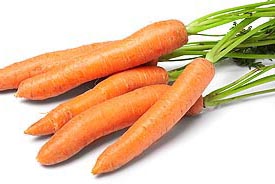Crunch on Carrots to Fight Cancer

Carrots are nutritional heroes — they store a goldmine of nutrients.
Beta-carotene is a substance that is converted to vitamin A in the human body, and is a powerful antioxidant effective in fighting against some forms of cancer, especially lung cancer. A 1/2 cup serving of cooked carrots contains four times the recommended daily intake of vitamin A in the form of protective beta-carotene.
A study published in the Journal of Agricultural and Food Chemistry found that falcarinol, a natural phytonutrient in carrots, can reduce the risk of cancer by a third. Falcarinol helps to protect carrots from fungal infections and defend itself against harmful pests.
The research team carried out tests on 24 rats with pre-cancerous tumors in laboratory conditions. They divided them into three groups and fed them different diets. The team found that, after 18 weeks, rats who ate carrots (the popular orange variety) along with their ordinary feed and the group which consumed falcarinol with their feed — in a quantity equal to that contained in the carrots — were one third less likely to develop full-scale tumors than the rats in the control group.
The experiment was conducted using raw carrots so researchers do not yet know if eating boiled carrots or drinking carrot juice, for example, would have the same effect.
Dr. Kirsten Brandt from the University of Newcastle-upon-Tyne, who led the study, recommends that everyone eat at least one small carrot every day, together with other vegetables and fruits, to benefit from their health-giving properties.
Carrots are also a very good source of dietary fiber, vitamin C, vitamin K, folate and manganese, and a good source of vitamin B6, pantothenic acid, iron, potassium and copper.
Carrots can be eaten raw or cooked, but to obtain maximum benefit it is best to eat them raw.
|